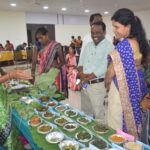Water scarcity is an issue in Mokhada taluka for decades. Despite the heavy rainfalls, the water does not get contained in the ground due to steep hilly terrains and the light soil. This has led to migration of families after monsoon season for income opportunities in towns and cities. An Adivasi farmer Prakash was concerned about their generational tradition of migrating as he had 8 people in his family including his mother, wife, and 6 children. Although he owned 13 acres of agricultural land, the land was becoming barren. With his family, he started growing rice, finger millet and similar paddy crops in monsoon. Just like other farmers, he had to migrate with his family for around 7-8 months to earn wages as labourers. He managed to secure further employment for his family by working in a brick kiln. While both Prakash and his wife worked at these kilns, the health and education of their children was getting neglected.
In the year 2020-21, Prakash started to participate in AROEHAN’s initiatives for village development. Prakash not only looked out for himself and his family but also motivated other people in village to participate in health, education, good administration, water, and agriculture programs organised by AROEHAN. Prakash had a penchant for enabling the tribals, who were dependent on traditional agriculture labour, to cultivate perennial crops in their own land. Prakash and other farmers got to witness the vegetable and orchard cultivation by farmers from other villages in Mokhada through the farmer study tour conducted by AROEHAN in 2021.
This served as inspiration for Prakash and 13 other farmers of Dolhara for orchard planting under the guidance of AROEHAN. A small farm pond was excavated in the field of each of these farmers pre-monsoon to solve the water issue after orchard planting. It was then covered in plastic, allowing the rainwater to collect there and irrigate the fruit trees over the following 7-8 months. The farmers were provided with orchard plants and cultivation kits by AROEHAN. Although, this was not sufficient to prevent migration all together. There was a need for a sustainable water resource throughout the year. A dam was constructed at the time near the village but since the construction was new, local’s use was prohibited. Prakash pursued to resolve this matter with the help of AROEHAN’s activists and local farmers. This matter was taken to the district level and with regular follow up, they got the permission in March 2022 to draw the water. With the help of AROEHAN, water was lifted with the help of a 7.5 HP pump by constructing a solar system of 10 KW capacity at that place under the ASHA project. Water was taken from the dam to a high hill with the help of a pipeline and water was delivered to the fields of all 15 farmers through a distribution tank.
After the water reached the farm, Prakash started cultivating different crops in his farm, including fruit trees, beans, vegetables. Prakash got Rs 30000 in just 4 months from vegetable income in the first year of cultivation. Prakash decided to build a house on the farm as he noticed the prevalence of stray animals while farming. The most expensive part of house construction was buying bricks. Prakash made 50,000 bricks in the month of December to February by building a brick kiln on the farm with the help of his family using the water that came through the pipeline on the farm. Out of these 17000 bricks were used for his own house and the remaining 33000 bricks were sold in the village, from which Prakash got an income of Rs 2,10,000. Prakash bought other necessary things for the house with the money received.
Along with other landless women in the village, Prakash’s wife established a self-help group. For this people to start a business Prakash gave half acre of land on his farm. The land was used for turmeric cultivation and mango grafting under AROEHAN’s guidance. Revenue of Rs. 20,000 and Rs. 7000 were generated from turmeric and mango grafts respectively. The group’s female members are pleased that the landless families are obtaining respectable employment in the village itself as a result of Prakash’s admirable desire to work with everyone.





